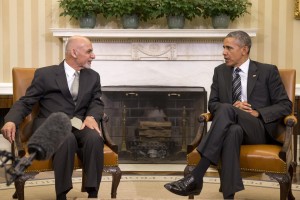Ashraf Ghani is the right man for a difficult job
When Ashraf Ghani ends his first official trip to Washington as president of Afghanistan today, he can look back on a job well done. In the course of only four days, the urbane Mr Ghani has managed three seemingly impossible things. He has staved off the great immediate fear that Afghanistan could unspool within months, just as Iraq did after US troops pulled out. He has renewed, at least fleetingly, America’s appreciation of and interest in Afghanistan. And he has effected a mini makeover for his embattled country in an America weary of its longest war.
The headlines are all about President Obama’s willingness to slow American withdrawal from Afghanistan and retain 9,800 troops in-country until 2016. But part of the back- story must surely be Mr Ghani’s determination to change the way that Afghans are perceived, seeking a hand up, not a perpetual hand out and thereby eminently worthy of support.
“We do not now ask what the United States can do for us, we want to say what Afghanistan will do for itself and for the world,” the Afghan president said in a subliminally astute reprising of JFK. But he could just as easily have quoted JFK’s predecessor, Dwight Eisenhower, who described the art of leadership as “getting someone else to do something you want done because he wants to do it”. That Mr Obama is now prepared to reverse plans to halve troop numbers in Afghanistan is a measure of Mr Ghani’s good sense.
Most of Mr Ghani’s success lies in the fact that he is not Hamid Karzai, his curmudgeonly predecessor. Like Nouri Al Maliki, Iraq’s former prime minister, Mr Karzai publicly seemed to delight in being both changeable and vengeful about long-term American support. On his last day in office, Mr Karzai’s grizzly bear approach to diplomacy infamously led him to a boorish rant against America. It was later described in unusually severe terms by the US ambassador in Kabul as “ungracious and ungrateful”.
But that was then. In this past week, Mr Ghani has sought to replace some of those shared painful memories with happier vignettes. He has used common sense and courtesy (with Islamabad and Beijing too, as much as Washington) rather than Mr Karzai’s notorious preen-and-pout tool of foreign policy. With alternate bursts of humility and hosannas for America’s “sacrifice” in Afghanistan in the past 14 years, Mr Ghani pressed his request for continuing material and logistical support for the Afghan security forces as they fight the Taliban and a new, though still unquantified ISIL threat in his country. And in a welcome change of tone, he promised that Afghanistan would not remain a burden on the West but would “own” its many problems and build a government that can support itself economically, socially and militarily.
It all sounds wonderfully aspirational and grown up, much removed from what an Afghan official told me in Kabul in the twilight of Mr Karzai’s 13-year rule: “We’re still not a real country, just an acting one.”
Afghanistan has moved on a bit from that phase even though the business of governance is still a perpetual tightrope exercise six months into Mr Ghani’s tenure. For starters, he is condemned, like Santiago, the fisherman in Hemingway’s novel, The Old Man and the Sea, to stay attached to the big marlin he’s unwittingly pulled but which is also pulling him.
In Mr Ghani’s case, the marlin is Abdullah Abdullah, his rival in last year’s presidential election and now holding the bizarre title of chief executive officer of Afghanistan. Both men are joined for the conceivable future in so competitive a power-sharing arrangement that even state visits are undertaken with Mr Abdullah watchfully at Mr Ghani’s side, while cabinet appointments are a tortuous process of trade-offs. This is why despite promising a full cabinet within 45 days of taking office, Mr Ghani has still only been able to fill eight of the 25 positions, the crucial defence portfolio has an interim appointee and the so-called “national unity” government seems unable to coalesce around nominees for other key ministries – economy, trade and industry and agriculture.
It’s a “lengthy period” of government formation, as Mr Obama delicately put it on Tuesday and it signifies the dysfunctional nature of a country that also happens to be the poorest in Asia (despite the $60 billion poured into it from 2001), one of the world’s most corrupt and with acute and continuing security problems.
The tragic timing of Tuesday’s attack on a bus not far from the capital Kabul, which left 13 people dead, is undeniable. It underlined the fragility of Afghanistan’s security situation even as Mr Ghani made the rounds in Washington arguing that American military muscle and money is needed to help prop up Afghan forces.
That he asked at all, suggests Mr Ghani is a pragmatic patriot. He knows that the 352,000-man strong Afghan National Security Force needs time and support to pursue its current campaign against insurgents ahead of the “fighting season”. He also has to find and train new recruits to replace those who die or desert, even as Afghanistan and Pakistan cooperate for the first time on mutually beneficial anti-militancy measures, and on securing Afghanistan’s long border.
That Mr Obama agreed indicates how anxious the US is to avoid a repeat of Iraq, where the last convoy of 500 American soldiers departed in December 2011. The country then slipped into civil war while prime minister Al Maliki revelled briefly in his gutsy decision to throw them out.
For now, it is enough that Mr Ghani is not driven to such vainglorious posturing.


